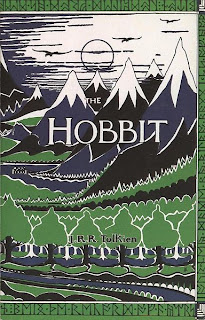J.R.R. Tolkien's The Hobbit is often overlooked in the light of his mammoth achievement, Lord of The Rings. The later may be more epic in its approach but it would be unfair to deny the small but magnificent achievement of The Hobbit its right place in fantasy literature. The return of Bilbo Baggins from his journey to the Lonely Mountains marks the conclusion of a little person's adventure. Yet only when seen in a historical chronology does it gather real significance. The accidental discovery of the Ring in Gollum's cave occurs as early in the text as its fifth chapter, putting the Baggins name on the trajectory of revolutionary events and inspires the creation of possibility of a new world.
On to the text itself: the story has the quality of a quaint fairytale more than that of a legend or an epic. Instrumental to this effect is the use of language. Language in The Hobbit is lighter and more buoyant than its sequel in which one assumes Tolkien could afford the luxury to contemplate on natural geography and sombre subjects. Here, perhaps due to the comparative smallness of events - though not inconsequential - Tolkien's treatment of his subject matter is sprightly and humorous, giving the story an air of an adventurous fairytale. The fate of the world is not contingent upon Bilbo and the dwarves, although they do temporarily defeat evil in the finale. The company that set out from Bag End had wealth in their mind, treasures of precious jewels and gold and mithril. A fairytale would not do to talk about catastrophes such as the end of the world or the ultimate defeat of evil through a slow and torturous path to Mordor. The Hobbit reflects optimism and lacks an inner darkness and grimness that is integral to the plot of Lord of the Rings.
How is this optimism manifested? Through humour. The dwarves suffer in the hands of the goblins but their suffering is far from agonizing, and is treated comically: "...[A]nd more than one of the dwarves were already yammering and bleating like anything, when they stumbled into a big cavern". When the dwarves' ponies are eaten by the goblins, the murderous act is described with a passing touch of humour. Thorin and the Great Goblin have time, even, to engage in civil conversation. The villains here are comic trolls and stumbling goblins rather than Orcs, and Sauron is simply a distant "Necromancer". Adventures and events that had the likelihood of putting a permanent stop to their quest are solved by the very stuff fairytales are made of: wit and magic.
Tolkien's characterization of dwarves is not forgiving. They are depicted as money-hoarding, ungrateful, loud, foolish and greedy people (if not for Gimli, I would've taken an instant dislike towards them). "...dwarves are not heroes, but calculating folk with a great idea of the value of money; some are tricky and treacherous and pretty bad lots; some are not, but are decent people like Thorin and Company, if you don't expect too much". They set out to recover treasures stolen from their families, now hidden in the Lonely Mountains, and guarded by one terrorizing and dangerous Smaug. Occasionally they land into trouble with elves, goblins and a host of carnivorous spides, and who else but Bilbo Baggins, who was employed in their service only as a burglar, fishes them out. When the dwarves finally reach the goal of their quest, again it is Bilbo who is sent to the task of exploring the dark cave and has to parley with a dragon who is not even his enemy!
 Yet, it is through such encounters that the titular hobbit evolves from timid and hesitant to the brave leader - and occasional saviour - of the group. Bilbo defeats the many masks of death and battles with its manifestations to emerge alive though not unchanged. Therein lies the structural importance of the text's subtitle. Between 'there' and 'back again' is a world of change, a character's growth and transformation; a three-foot tall Bilbo Baggins' heroic adventure that has altered the course of Middle Earth's history.
Yet, it is through such encounters that the titular hobbit evolves from timid and hesitant to the brave leader - and occasional saviour - of the group. Bilbo defeats the many masks of death and battles with its manifestations to emerge alive though not unchanged. Therein lies the structural importance of the text's subtitle. Between 'there' and 'back again' is a world of change, a character's growth and transformation; a three-foot tall Bilbo Baggins' heroic adventure that has altered the course of Middle Earth's history.
And even if Bilbo is not tempted by Smaug's treasure under the mountain, although it is he who has recovered the stolen gold, it does not mean that he remains untempted by power and wealth. Perhaps it is poetic irony that while Bilbo gives away the Arkenstone jewel in The Hobbit, we learn in its sequel of the devastating effects that a simple ring has on him. It seems what was unnamed and unknown had a more malignant and poisonous ramification on the little hobbit than all the treasures had on the dwarves.


0 comments:
Post a Comment